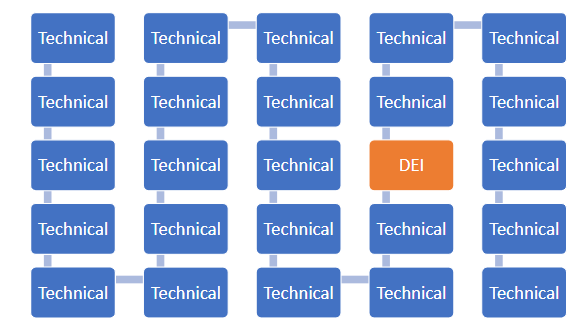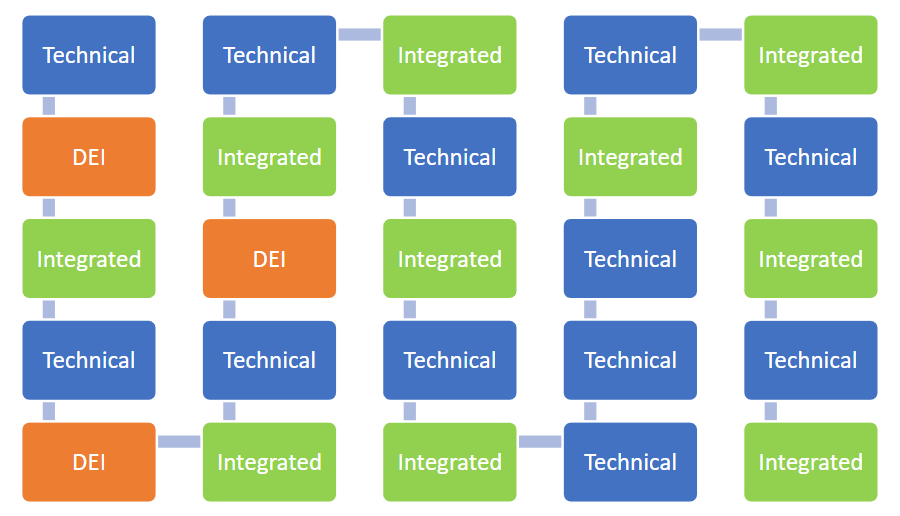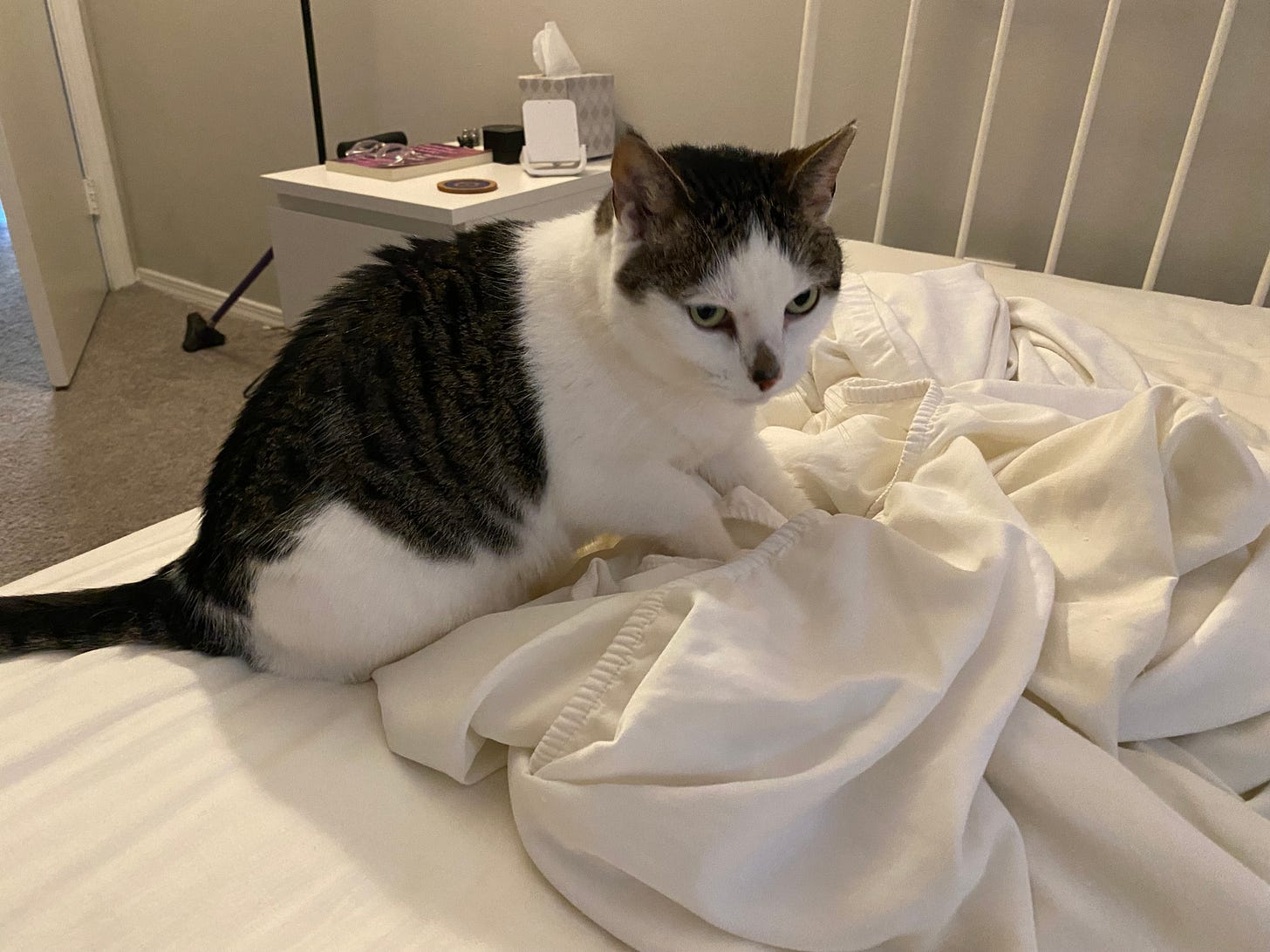Dealing With Pushback
On radical teaching, leveraging privilege, and my "agenda".
I’m a STEM educator who cares deeply about social justice and creating inclusive, equitable learning spaces. Engineering education is very much informed by the goals of the chemical industry (capitalist, extractive, inequitable, violent), so I feel as though it’s my responsibility to flip the script as much as I’m able to. I’m very intentional about not only how I curate my learning experiences but about which topics I cover in class. In my courses in chemical engineering unit operations, process control, polymer processing, and green chemistry, I have discussed everything from the pitfalls of capitalism, the violence of colonialism, the evils of military-industrial complex, to the public health crises driven by plastic pollution, to the bemusement of many.
When I talk to other educators about my radical teaching style, the number one question I get asked is this: “Do you get any pushback for this?” I’d like to try to answer that question and respond to any “Devil’s advocates” in my audience who would like to incorporate social justice into their STEM teaching, but are hesitant.
The short answer is, mostly no, I don’t face too much pushback, because I am lucky. I am lucky because UMass Amherst typically values diverse perspectives, I am lucky because my department is thrilled to have me teaching original courses on polymer processing and green chemical engineering, and I am lucky because my department leadership has basically given me full rein to cover whatever topics I like without too much oversight. I was specifically hired to teach process control (a core course in my curriculum) and to oversee DEI activities in the department, so by existing as my radical queer self and creating safe spaces for these deep discussions, I am actually doing what is expected of me. I am proud to work in such an accommodating department!
Being white is also a big part of why I’m able to get away with leading these sorts of discussions. There are no Black faculty in my department, and there are many (racist) reasons for that, so I feel it’s my duty to push the envelope beyond what most white people are comfortable doing. I won’t lie: I say things in the classroom that would get a Black faculty in deep trouble, either because white students are more likely to tolerate a conversation about environmental racism from a white faculty than a Black faculty, or because a white faculty like myself is less likely to be scrutinized for utilizing more progressive teaching styles.
That said, I do face a lot of weird looks and skepticism from those in my field who are, on paper “fine with diversity, equity & inclusion” (a term I am not the biggest fan of), but would say that I’m doing “too much” or “not focusing enough on the Hard Science”. I have also heard whispers of colleagues thinking I have “an agenda” that I’m trying to push. Let’s address these one by one…
Accusation 1) I’m Not Focusing Enough on The “Hard Science”
Much has been written about the hard/soft distinction in science, particularly from feminist scholars. The Hard Sciences (engineering, physics, chemistry, medicine, etc.) are mathematical, quantitative, objective, strong, masculine, phallic. The Soft Sciences (sociology, psychology, gender studies etc.) are artistic, qualitative, subjective, weak, feminine, yonic. Us engineers are supposed to be the former, because supposedly, only this will keep society running. Let the feminists and artists do their weird shit over in the corner; we’ve got real work to do.
Needless to say, I disagree with this assessment of science, particularly science education. Unquestionably, the decisions of scientists and engineers have a ripple effect on all of society; computer science dorks are deciding everything from how our digital spaces are constructed to who gets hired for certain jobs to who gets sent to prison, civil engineers and architects continue to build inaccessible spaces and fail to embrace planet-friendly designs, and chemical engineers are only recently, and quite slowly, building the technology necessary to divest from the petrochemical industry and bring climate change to a halt.
All of these “engineering problems” intersect with social injustice in a thousand ways. In my mind, it’s only appropriate to train modern engineers to be competent in the social impact of their technologies. Besides, any company worth their salt has a diversity initiative or community engagement program, and every meaningful grant fund requires a “Broader Impact” statement, so failing to train our engineering to be socially responsible, aware citizens will only harm them as they get jobs in either industry or academia. The future of STEM education is interdisciplinary and socially-engaged; we must get ahead of the game if we’re gonna keep up with these trends.
Accusation 2) I Can’t Do All That
Of course, some engineering teachers think that while social issues are important, they’re impossible to fit into existing courses because they’re so packed with the “traditional” content (most dry equation-solving). I have had STEM faculty literally tell me that they would love to incorporate discussions of social issues into their classes, but that they don’t feel like they can do so because their technical content is just that densely packed. Every moment spent talking about environmental justice, or another Social Justice Topic, is a moment not spent on a derivation, or another piece of Important Technical Content, and since the Important Technical Content is required to be there (by ABET, or to understand the next course in the undergraduate sequence, i.e. Thermo I → Thermo II), the social justice just doesn’t make the cut.
I would argue, first of all, that if your course is that dense and inflexible, it might just be a poorly-designed course to begin with. Do your students enjoy having new material dropped on them daily with no opportunities for reflection? Are they able to keep up with the material if they get sick and miss a day? What happens if you get sick and can’t teach for a week? Do your students enjoy completing new homework sets due every week? Do you enjoy having to grade these assignments all the time? I beg you all, absent any conversation of new material being added to your course, to provide some leeway to your students, please!
This kind of thinking also inherently devalues the broader impact of engineering work; the Technical Content must be there, all that woke stuff is just bonus material that we can fit in if and only if there’s sufficient time. And conveniently, that time never comes. Probably because that time is never made.
When instructors do agree to be a bit more flexible, it typically comes in the form of a “bonus lecture”, often at a convenient time during the semester such as right before Fall/Spring break or even on the very last day of class. Usually, the content this “DEI Day” (since all issues not strictly related to pure math are lumped together as “all that woke stuff”) is never reinforced in later lectures or assignments, if it’s ever discussed again at all. This paradigm is shown in the figure below, with each block representing a day or week of a typical STEM course. This approach does potentially expose students to new ideas, but it has its drawbacks, namely that students can easily skip this one lecture, either because they’re not interested or because they’ve already mentally checked out of the class. Even students who enjoy this non-technical content might not make the connection between this Fun Bonus Day and the material they’re learning in class. By not weaving social justice content into the very fabric of your course, the content will be lost on students, and may even backfire on you as students complain that you’re taking away from the “real” course content.

What if we imagined a new paradigm where technical content and discussions of social justice in engineering were not discussed separately, but instead integrated with one another? We all know that students learn better when real-world examples are involved rather than abstract equation-solving. My dream is that we can have days of pure equation-solving, but also days where we discuss technical content in terms of the broader impact. I will also remind my readers that incorporating social justice content can be as simple as taking 5 minutes to have students reflect on how a given technology could disproportionate harm marginalized groups, either via general environmental injustice or creating a gap between those who have access to the technology and those who don’t. Social justice content, ideally, should not take away from the “core” course material, it should reinforce it. In my mind, this can only be done by weaving together the old and the new, integrating social justice competency into your course’s learning goals and assessment strategies (homework, projects, etc.)

Donna Riley, a chemical engineering educator at Perdue who wrote a textbook on Engineering and Social Justice, also wrote an entire textbook on 21st century thermodynamics problems that is very instructive here. Thermodynamics is often taught pretty dryly (“imagine a box with a nameless gas of this density being compressed to this volume; calculate the new pressure, please”) but thermodynamics is the study of energy, which makes it a prime space for discussions of energy justice. What if our calculations of Work or Energy were in service of calculating the work from a wind turbine or energy from a solar panel? What if students were using their skills in the classroom to assess the feasibility of different renewable energy technologies in different areas of the world, considering both geographic climate and social climate, complete with a discussion of why so many parts of the world still don’t have clean energy? (Hint: it’s capitalism and colonialism again!!) Riley’s textbook is chock full of these examples and is an excellent resource, even for those who don’t teach thermo, because it can inspire us to make connections between seemingly-math-heavy course material and real-world social problems. May we all follow in her example!
Of course, this isn’t to say that an educator who isn’t skilled in (for example) holding conversations on systemic racism (either because they aren’t familiar with the shape of systemic racism in their country or because they haven’t had experience leading such conversations in a way that doesn’t harm non-white students) must get to the classroom and run a case study on Warren County at once! Obviously, this requires training on behalf of the teacher. I’m just trying to map out new possibilities for STEM education that I honestly think should exist, for the benefit of our students and society.
The bottom line is this: using real-life examples of social injustice doesn’t take away from students’ understand of the “core” content; it enhances it.
Accusation 3) I Have An Agenda
This is what it all comes down to: the belief that I am secretly trying to make everyone into a woke, eco-socialist feminist, instead of teaching “real” science. I have an agenda, a political cause that’s getting in the way of me teaching the true, agreed-upon-for-decades course material that I’m “supposed” to be teaching.
Here’s my response to that: of course I do.
Of course I have an agenda. I will openly admit that I am curating and presenting information to students in a way that encourages them to challenge STEM norms, and that I associate being an anti-racist, anti-colonial, anti-war, eco-socialist feminist with being a better engineer and a better member of society. I look out into the world and I see climate change ravaging entire populations, women and trans people being abused and made powerless by a patriarchal system, Black and brown people being killed both here and overseas by American weapons and an increasingly-militarized police force, and countless other social issues which our engineering graduates are partially responsible for. Teaching is the one of the few tools that I have to do something about that, so I see it as my duty to at least try.
In the words of a wonderful artist: I want to save the world. Can we admit that to one another?
Here’s the thing: those who claim that they don’t have an agenda, who are “going with the flow” and teaching engineering the way it’s always been taught, most certainly do have an agenda. They just don’t realize it. By teaching engineering the “normal” way, they’re being influenced by the whims of the chemical industry, capitalism, the war machine, and more. Business-as-usual is an agenda, we’re just not trained to see it that way.
A common refrain in leftist circles applies here. It’s not men and women, it’s men and political. White and political. Able-bodied and political. Cisgender and political (although now they won’t even say cisgender, they’ll just say “transgender vs normal”, which goes to show you how far behind we are on trans issues). It’s a framing that’s meant to position the current societal default (assumed to be natural and not at all propped up by centuries of violence) as normalcy, thus superior, and any challenges to that position as fringe, unreasonable, illegitimate, inferior. In a way, it’s “hard versus soft science” all over again.
The difference between me and other educators is that I admit that I have an agenda, while everyone else doesn’t. And that makes them a hundred times more dangerous than I ever could be.
I will keep teaching my classes how I want to. I will do a damn good job teaching the ABET-required technical content, and I will do so in a way that promotes student success. To me, that means talking about real-world issues in a way that the majority of students are on board with. My teaching evaluations from students are awash with gratitude for how I cover modern engineering issues, with only a single accusation this year that I’m a “liberal with an agenda” (a laughable accusation, given that I am far more left-leaning than most American liberals).
Students are on board with my teaching style, and in fact, they’re thrilled about it. It’s the old guard that’s really getting in the way.
If you’re curious about the other teaching approaches I’ve taken, subscribe and stay tuned! I have more educational materials in the works. Plus, paid subscribers to this newsletter get access to a full social justice in engineering education workshop that I ran this past Spring, so consider signing up now if you’d like to take a look! Happy learning, folks!
Currently Reading
Speaking of novel approaches to talking about engineering, non-binary icon Luke Landherr helped to write a comic book introducing the field of chemical engineering! The real indoctrination of kids that I’m doing is convincing them to become chemical engineers. More of this, please!
Right now I’m reading Jenny Odell’s book “How To Do Nothing: Resisting the Attention Economy”. More accurately, I’m listening to the audiobook while driving, doing laundry, or accomplishing other tasks… I know, I’m pathetic, but I have to start somewhere, okay?? More thoughts on this once I finish it!
In case you missed it, I was featured in Inside Higher Education last week! You can also read about my syllabus zine design history in my previous posts.
Watch History
I’m not sure how I’ve slept on Zoe Bee for this long, considering she’s an educator who also loves social justice, but her latest finally got me to subscribe. It’s all about the concept of “parents’ rights” and specifically asking, “parents’ rights to do what, exactly?”
A lot of digital ink has been spilled about Kwebbelkop, the gaming/reaction YouTuber who’s trying to turn his whole operation into something that can be achieved solely by AI, but Ro Ramdin does it best (as usual)! I have my own take on virtual influencers, which you can read here.
My content creator friend Maybe Burke has a YouTube channel now, mostly covering makeup tutorials aimed at trans women who never had the formative years of beautification experience. Go check her out if you want to learn the fundamentals of the craft!
Bops, Vibes, & Jams
The new Cherry Glazerr album is great, please enjoy “Bad Habit” and “Ready For You” (also, this electronic track from earlier this year that I continue to be obsessed with).
The queerness of Sufjan Stevens’ music has long been undeniable, although Stevens has rarely discussed his sexuality publicly. This week, he stated that his new album “Javelin” is dedicated to his late partner, Evans Richardson, thus officially coming out as not straight. Heartbreaking and heartwarming all at once, just like his music!
For more queer joy, check out Hazel English’s cover of “There She Goes” by The La’s.
And now, your weekly Koko.
That’s all for now! See you next week with more sweet, sweet content.
In solidarity,
-Anna



